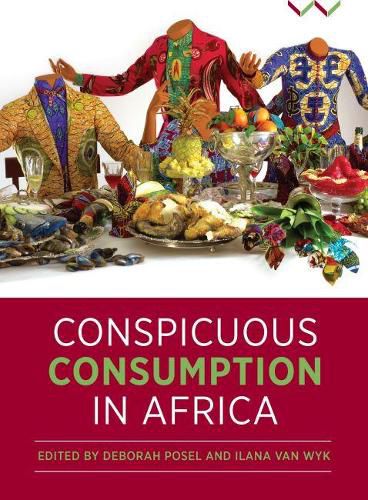Readings Newsletter
Become a Readings Member to make your shopping experience even easier.
Sign in or sign up for free!
You’re not far away from qualifying for FREE standard shipping within Australia
You’ve qualified for FREE standard shipping within Australia
The cart is loading…






This title is printed to order. This book may have been self-published. If so, we cannot guarantee the quality of the content. In the main most books will have gone through the editing process however some may not. We therefore suggest that you be aware of this before ordering this book. If in doubt check either the author or publisher’s details as we are unable to accept any returns unless they are faulty. Please contact us if you have any questions.
From early department stores in Cape Town to gendered histories of sartorial success in urban Togo, contestations over expense accounts at an apartheid state enterprise, elite wealth and political corruption in Angola and Zambia, the role of popular religion in the political intransigence of Jacob Zuma, funerals of big men in Cameroon, youth cultures of consumption in Niger and South Africa, queer consumption in Cape Town, middle-class food consumption in Durban and the consumption of luxury handcrafted beads, this collection of essays explores the ways in which conspicuous consumption is foregrounded in various African contexts and historical moments.
In 1899, Thorstein Veblen coined the phrase ‘conspicuous consumption’ to describe status-seeking in the obscenely unequal world of late-nineteenth century America. Many of the aspects he described in The Theory of the Leisure Class are still evident in our world today. While Veblen’s crude denunciation of material extravagance finds echoes in media exposes about the lifestyles of the rich worldwide, it is particularly recognisable in reporting on Africa. Here, images of conspicuous consumption have long circulated in local and global media as indictments of political corruption and signs of moral depravity.
The essays in Conspicuous Consumption in Africa put Veblen’s concept under robust critical scrutiny, drawing on theorists like Mbembe, Guyer and Bayart by way of critique or addition. They delve into the pleasures, stresses and challenges of consuming in its religious, generational, gendered and racialised aspects, revealing conspicuous consumption as a layered set of practices, textures and relations. The authors resist the trap of easy moralisation, pointing to more complex ethical and political registers of analysis and judgement. This volume shows how central and revealing conspicuous consumption can be to fathoming the history of Africa’s projects of modernity, and their global lineages and legacies. In its grounded, up-close case studies, it is likely to feed into current public debates on the nature and future of African societies - South African society in particular.
$9.00 standard shipping within Australia
FREE standard shipping within Australia for orders over $100.00
Express & International shipping calculated at checkout
This title is printed to order. This book may have been self-published. If so, we cannot guarantee the quality of the content. In the main most books will have gone through the editing process however some may not. We therefore suggest that you be aware of this before ordering this book. If in doubt check either the author or publisher’s details as we are unable to accept any returns unless they are faulty. Please contact us if you have any questions.
From early department stores in Cape Town to gendered histories of sartorial success in urban Togo, contestations over expense accounts at an apartheid state enterprise, elite wealth and political corruption in Angola and Zambia, the role of popular religion in the political intransigence of Jacob Zuma, funerals of big men in Cameroon, youth cultures of consumption in Niger and South Africa, queer consumption in Cape Town, middle-class food consumption in Durban and the consumption of luxury handcrafted beads, this collection of essays explores the ways in which conspicuous consumption is foregrounded in various African contexts and historical moments.
In 1899, Thorstein Veblen coined the phrase ‘conspicuous consumption’ to describe status-seeking in the obscenely unequal world of late-nineteenth century America. Many of the aspects he described in The Theory of the Leisure Class are still evident in our world today. While Veblen’s crude denunciation of material extravagance finds echoes in media exposes about the lifestyles of the rich worldwide, it is particularly recognisable in reporting on Africa. Here, images of conspicuous consumption have long circulated in local and global media as indictments of political corruption and signs of moral depravity.
The essays in Conspicuous Consumption in Africa put Veblen’s concept under robust critical scrutiny, drawing on theorists like Mbembe, Guyer and Bayart by way of critique or addition. They delve into the pleasures, stresses and challenges of consuming in its religious, generational, gendered and racialised aspects, revealing conspicuous consumption as a layered set of practices, textures and relations. The authors resist the trap of easy moralisation, pointing to more complex ethical and political registers of analysis and judgement. This volume shows how central and revealing conspicuous consumption can be to fathoming the history of Africa’s projects of modernity, and their global lineages and legacies. In its grounded, up-close case studies, it is likely to feed into current public debates on the nature and future of African societies - South African society in particular.